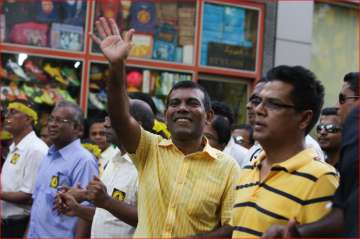In a rebuff to China for warning India to keep off from interfering in the Maldives, the Indian Ocean nation's exiled ex-President Mohamed Nasheed on Wednesday reiterated his appeal to India to intervene, saying his countrymen view New Delhi's role "positively" and during the 1988 crisis India were "not occupiers but liberators".
Nasheed said in a tweet: "Saying 'resolve things internally' is akin to asking us to escalate the revolt, which can lead to chaos. Maldivians see India's role positively: in '88 they came, resolved the crisis, and left. They were not occupiers but liberators. This is why Maldivians look to India now."
The tweet by Nasheed, a friend of India, came as China, in apparent reference to India, on Wednesday cautioned against outside interference in the Maldives' internal affairs, saying it would "complicate" the situation.
On Tuesday, Nasheed, who lives in self-exile in Britain, had asked India to intervene militarily to help resolve the burgeoning crisis in his archipelago nation which is under a state of Emergency clamped by President Abdulla Yameen.
"On behalf of Maldivian people we humbly request: 1. India to send envoy, backed by its military, to release judges and political detainees including President Gayoom. We request a physical presence. 2. The US to stop all financial transactions of Maldives regime leaders going through US banks," he had tweeted on Tuesday.
India had in a strong statement said that it is "disturbed" by the situation in the Maldives where the Supreme Court Chief Justice and another senior judge has been jailed and emergency clamped. Yameen clamped emergency days after the apex court in a ruling last Thursday ordered the release of nine political prisoners, including Nasheed, and the reinstatement of 12 legislators who were unseated for defecting from the ruling party and annulled the apex court's previous ban on floor-crossing.
In more tweets on Wednesday, Nasheed said: "President Gayoom and the Judges must be released immediately. I am told President Gayoom is not taking food, while (jailed Supreme Court) Justice Ali Hameed has been ill treated."
He said "Hon Qasim's son, Ibrahim, has been arrested. This is clearly politically motivated. This disgraceful, illegal arrest must be reversed and he must be immediately freed," Nasheed posted.
Turmoil in the Indian Ocean archipelago nation began when President Yameen refused to release Nasheed along with other nine high-profile political dissidents, in defiance of a February 1 apex court order, sparking protests.
On Monday, Yameen declared a 15-day state of emergency, giving sweeping powers to troops to arrest and detain individuals while curtailing the powers of the judiciary and the legislature.
He also ordered the arrest of the Supreme Court Chief Justice Abdulla Saeed and another judge, Ali Hameed.
Former President Maumoon Abdul Gayoom, who allied himself with the opposition, was also detained at his home.
Hours after the judges arrests, the court's remaining three judges revoked the court's release order "in light of the concerns raised by the President".
The US State Department said it was "troubled and disappointed" by the developments in Maldives, while British Foreign Secretary Boris Johnson called on Yameen to lift the emergency.
India, China and Britain have issued travel warnings for their citizens.
China has invested heavily in the infrastructure and booming tourism sector in the Indian Ocean nation. In 2017, Maldives became the second country after Pakistan to sign a free trade agreement with China.
Latest World News
